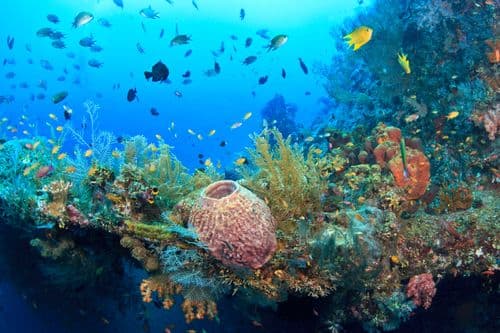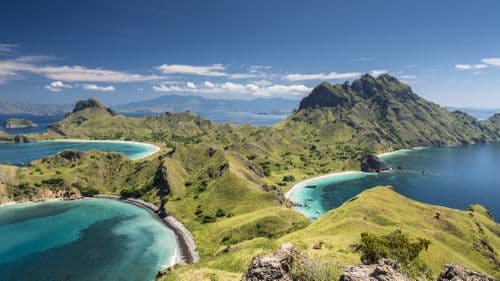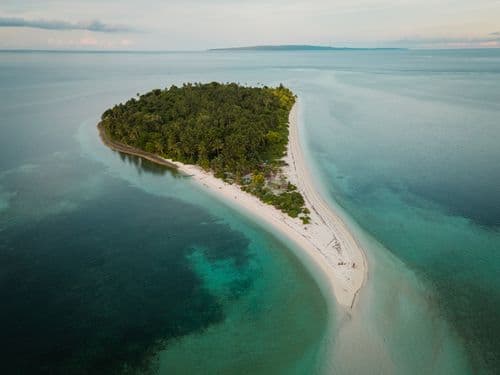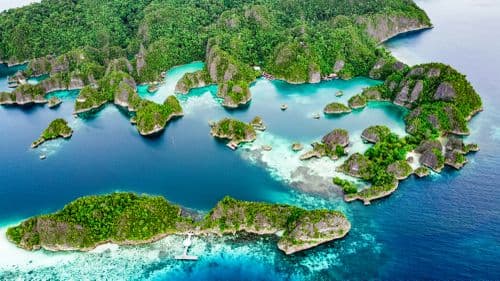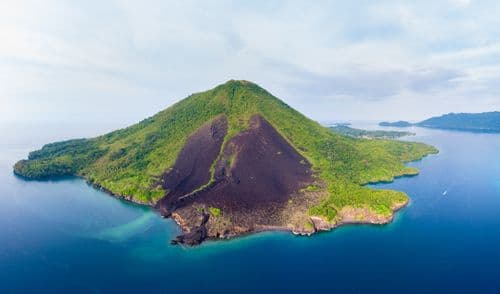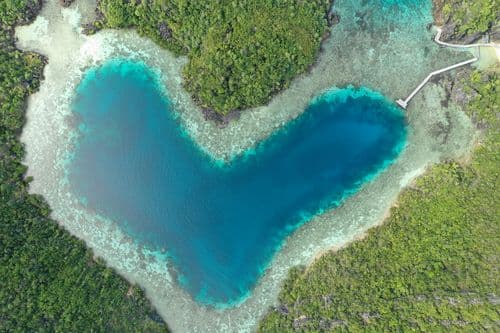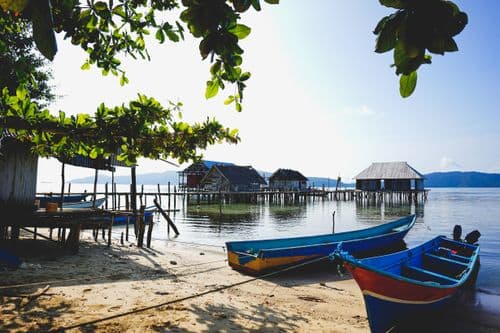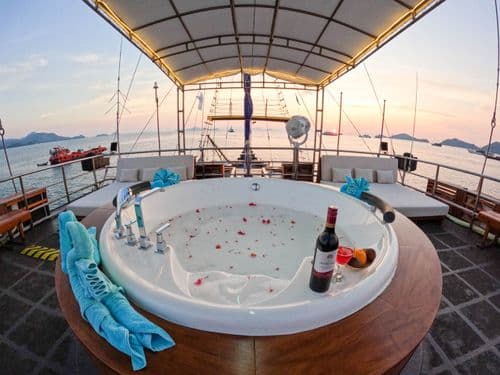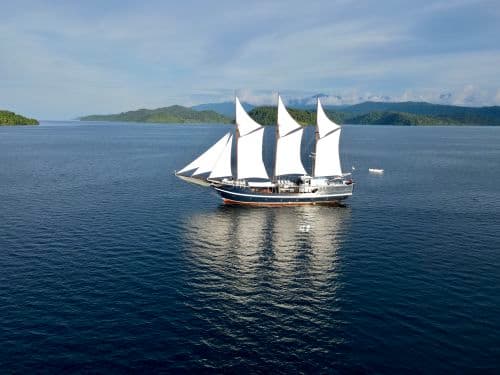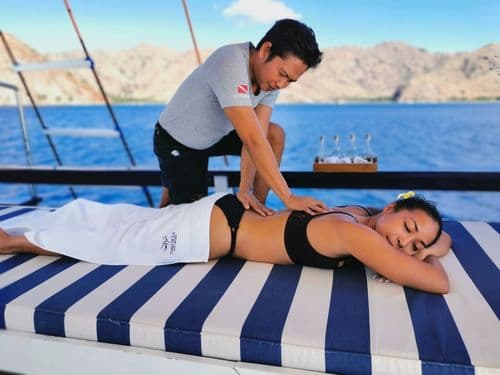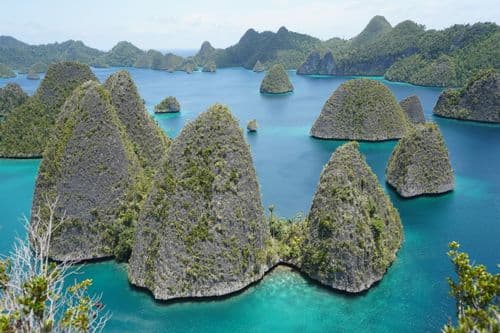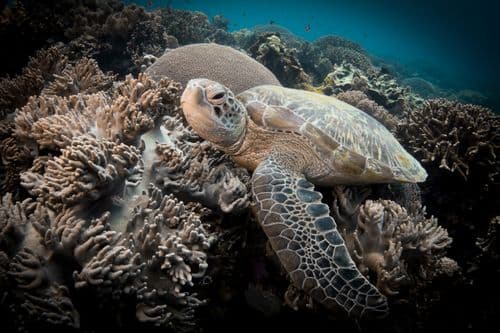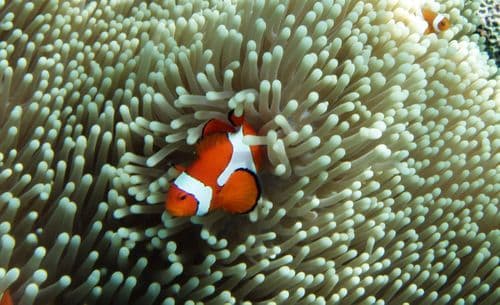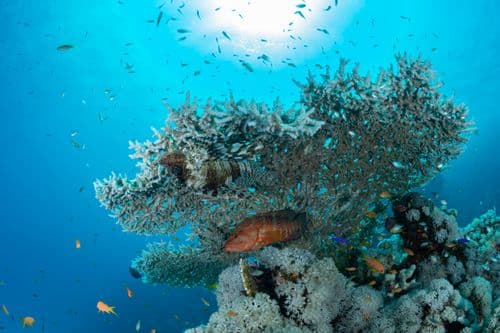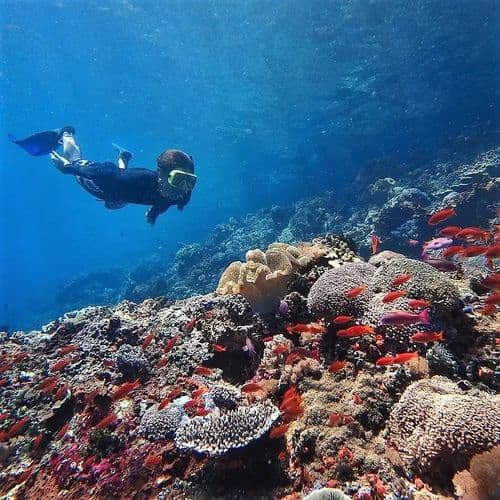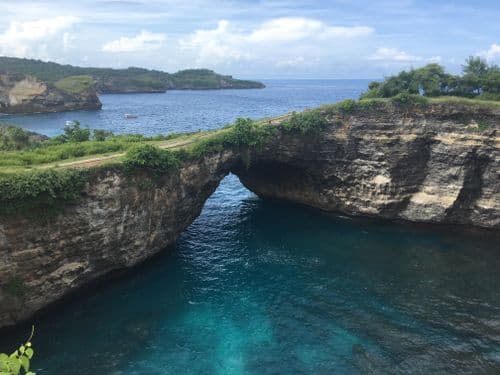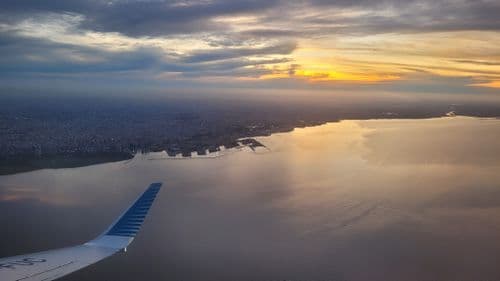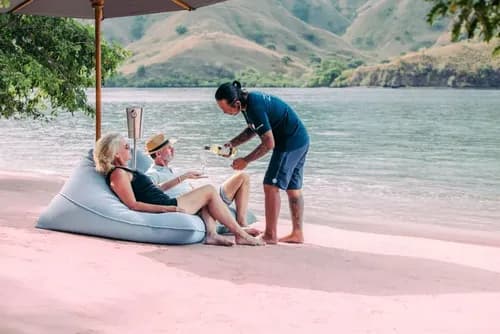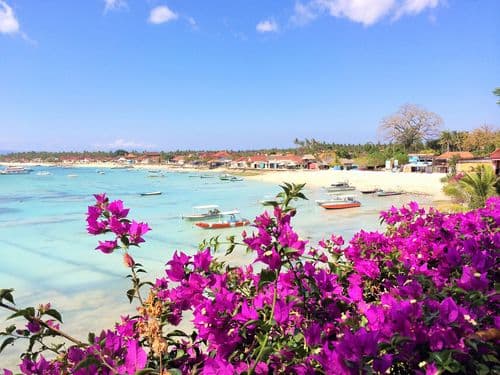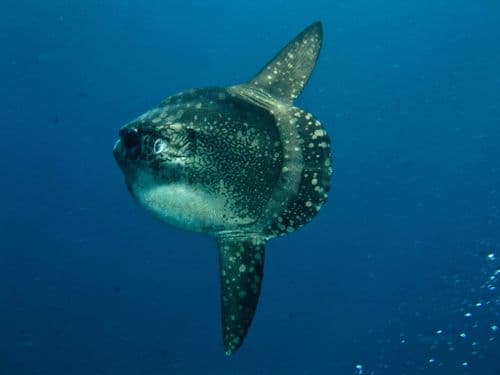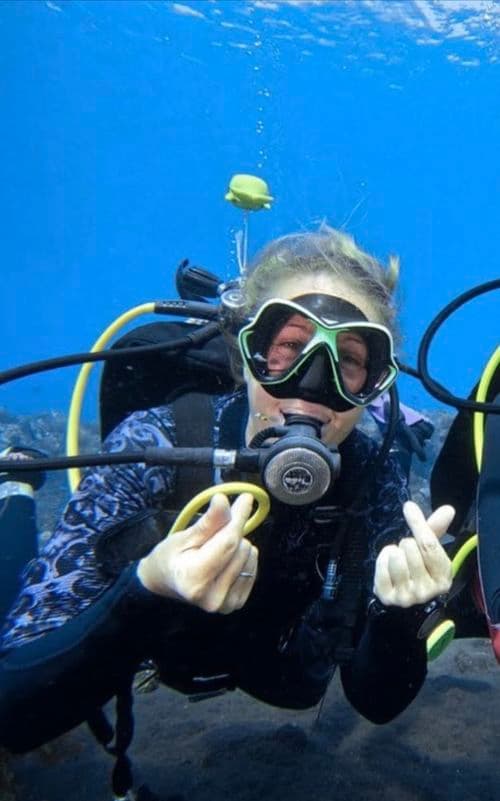
Central Maluku & the Banda Islands
A 12-day expedition on board the Dewi Nusantara
Length
12 Days
Ship category
Luxury
Ship type
Small Ship
Capacity
18 Passengers
Central Maluku & the Banda Islands
8 Reviews
Trip highlights
Explore a WWII shipwreck
Dive the “Spice Islands” with rich volcanic reefs
Swim with sea snakes
Enjoy the best wall dives in Indonesia
The DiveIndonesia experience
Five-star comfort with large staterooms and an elegant Master Suite.
Designed for divers with a dedicated dive deck and expert guides.
Features camera stations and charging areas for photographers.
Enjoy a blend of Indonesian and international cuisine
This 12-day adventure aboard Dewi Nusantara begins and ends in Ambon, taking you through the breathtaking waters of Central Maluku and the Banda Islands. Known for their rich history as the “Spice Islands,” these locations offer volcanic reefs, vibrant coral gardens, and an impressive variety of marine life. The itinerary includes up to 35 dives at iconic sites like Ambon Bay, Nusa Laut, and Manuk Island.
Beyond diving, guests can enjoy beach excursions, cultural tours, and snorkeling. The luxurious Dewi Nusantara ensures comfort with spacious cabins, fine dining, and a dedicated dive crew.
Your ship: Dewi Nusantara



We highly recommend the Dewi Nusantara for those seeking the pinnacle of luxury and adventure in Indonesian waters. This 58-meter, three-masted schooner was meticulously crafted with divers in mind, combining traditional Indonesian design with modern amenities to create a liveaboard experience unlike any other. Since her launch in 2008, Dewi Nusantara has become an icon in the world of luxury liveaboard diving.
When you board Dewi Nusantara, you'll be entering a world of elegance and top-notch service. The ship’s spacious cabins are tastefully designed, each one offering a personal sanctuary … Read more about Dewi Nusantara
Cabins


Amenities
Transfers to and from ship
Bar
Observation Deck
Wetsuits (can be rented)
Snorkel gear (free of charge)
Kayaks on board
All meals
Beer+wine with dinner
Air conditioning & private bathroom
Single travellers can share cabin
Water, Coffee, Tea & fresh juices
Restaurant
Food & Drinks
Onboard dining is an experience in itself. The Dewi Nusantara’s chefs prepare a diverse array of dishes, blending local Indonesian flavors with international cuisine. The 1st breakfast is a grazing breakfast buffet-style. After the 1st dive, guest have the 2nd breakfast, they can order from a list of a variety of dishes. Meals for lunch are served buffet-style. Elegant dinner has a waiter service (but no dress code). Snacks and soft drinks are available at any time of day and night. Most special dietary requirement are easily accommodated
Map
Itinerary
Your itinerary below may vary, depending on the weather, wildlife breeding, and local conditions.
Day 1
Ambon



Embarkation time is 12 noon. If you arrive on an early flight, the Dewi team will meet at the airport and take you to a hotel for breakfast and coffee. The Dewi Nusantara cruise package includes a transfer from the embarkation airport to the harbour, where the boat will be waiting for you. The crew will greet you outside the arrival hall and help you with your luggage. Please look for a crew or agent from our transfer company holding a Dewi Nusantara sign or a sign with your name.
Day 2
Ambon



Laha, a village on the northern shore of the Ambon Inlet, is home to The Twilight Zone, the area’s famous original critter dive site, close to the fishing boat piers. This is muck diving at its finest. The locals and the fishing boats have deposited detritus on the sand, silt, and gravel seabed. This combination of natural and human material provides the perfect habitat and environment for a stellar expedition to seek out the weird and wonderful.
In recent years, numerous additional sites along this prolific stretch of shoreline have been discovered. The first discovery of the freaky psychedelic frogfish occurred here, and future discoveries are sure to follow. For a slightly different dive experience, we could even consider exploring the Duke of Sparta, a massive and nearly intact shipwreck located further into the bay and closer to the city.
Day 3
Molana

Molana and the larger island of Saparua are two islands in the Lease Island group. Lying in the northern reaches of the Banda Sea, these islands are renowned for their vibrant coral reefs, diverse marine life, and pristine waters. Molana is particularly famous for its stunning coral gardens and abundant marine biodiversity. Divers can explore a kaleidoscope of corals, sponges, and sea fans, accompanied by a myriad of colourful reef fish, as well as some larger species. The island’s underwater terrain includes gentle slopes, drop-offs, and underwater caves, providing varied dive experiences from shallow reef dives to more challenging deepwater explorations.
Saparua’s underwater landscape features walls, slopes, and pinnacles, offering divers a chance to experience different underwater topographies. The island’s historical significance, with remnants of Dutch colonial forts and artefacts, adds an extra layer of intrigue for divers who are also history enthusiasts.
Day 4
Run - Suanggi Island



Diving around the island of Run and its much smaller neighbour, Suanggi, a few miles further north, offers an extraordinary underwater experience rich in history and natural beauty.
Suanggi is a small, rocky outpost on the approaches to the Banda Islands. This remote islet is rapidly gaining a reputation for being one of the expanding number of destinations where it is possible to encounter schooling hammerhead sharks.
The dive sites at Run feature stunning coral gardens, dramatic drop-offs, and an array of vibrant sea creatures, including colourful reef fish, majestic manta rays, and, like Suanggi, the chance to spot schooling hammerhead sharks. The crystal-clear waters provide exceptional visibility, often reaching up to 40 metres, making it a paradise for underwater photography and exploration. The island’s historical significance as a former centre of the spice trade adds a unique cultural layer to the diving experience, blending adventure with a sense of discovery.
Whether you are a novice or an experienced diver, Run Island’s untouched marine environment promises a captivating and unforgettable diving adventure.
Day 5
Manuk



The BBC wildlife documentary “Island of the Snakes” made Manuk’s mythical island volcano famous. Arriving here at dawn, the air becomes pungent with a sulphur aroma as a yacht gets closer to the island. Although this small island is not particularly high, rising to just under 300 metres, Manuk is a favourite with seabirds and supports huge frigate and booby communities.
A jagged, rocky coastline, devoid of beaches, borders the island. As the terrain rises, there is only a small amount of growth above the short tree line. However, the stark volcanic scenery is nothing short of spectacular, with one or two sulphur-encrusted smoke holes. For the brave of heart, there appear to be one or two likely places where it is possible to get onto the islands for an exploratory trek.
Diving at Manuk is a somewhat unique experience. The island’s constant geothermal activity likely attracts a large community of sea snakes, with the olive variety being the most common. The signature dive site, Manuk Ridge, on the south-east corner of the island, is a big favourite, both with divers and, at times, schooling hammerhead sharks. The west side of the island has a gently sloping nature and supports large coral gardens, making it a favourite for sea snakes. At times, they gather in such large numbers that the underwater experience can be a little unnerving.
Day 6
Hatta



Hatta Island offers scuba divers a remarkable underwater adventure. The island, part of the Banda Islands group, boasts crystal-clear waters teeming with vibrant marine life and stunning coral reefs. Divers can explore diverse underwater landscapes, including dramatic drop-offs, coral gardens, arches, and underwater caves. The marine biodiversity is extraordinary, with sightings of colourful tropical fish, turtles, reef sharks, and occasionally manta rays and dolphins. Hatta Island’s relatively undisturbed ecosystem provides an ideal environment for both novice and experienced divers seeking to experience the beauty of Indonesia’s underwater world. The island’s warm, inviting waters and the abundance of marine species make it a must-visit destination for anyone passionate about scuba diving.
Just two nautical miles further south lies Skaru Reef, or Karang Hatta. This massive, surface-breaking rock formation has numerous points around its exterior where the shimmering shallows drop off into deep water, providing plenty of dramatic big fish dive sites to explore.
Day 7
Banda Neira



Already during this trip, we have visited the outer islands of the Banda group, Run and Hatta. Now it is time to explore the central hub. Several diverse dive sites await us here, starting with the Mandarin Hotel. At first glance, this stretch of rocks and sand, right on the border of the colonial Molana Hotel’s lovely gardens, appears to be quite unremarkable. However, once under the surface in the shallows, it turns out to be very interesting indeed. It is home to a group of mandarin fish, some of them quite large, that perform their elaborate mating displays at dusk. They are also relatively easy to photograph; they don’t have any corals to hide in and have to perform al fresco, out over the rocks.
The 600-metre-high volcano Gunung Api, located across the water from the harbour, dominates Banda Neira, the principal island. This fiery mountain’s most recent eruption was in 1988. This cataclysmic event produced a lava stream that flowed into the sea on the mountain’s north-east corner. This has produced a magnificent, fast-growing coral garden over the years since it oozed into the water. This is another site that should not be missed, if only to see how rapidly corals can take hold after such an explosive event.
Outside of Banda’s natural harbor’s shelter, there are even more exciting dive sites to discover. One favourite is Batu Kapal. This is quite different from the last two sites and takes in an offshore seamount much favoured by honeycomb moray eels and huge schools of fish.
Day 8
Nusa Laut



Nusa Laut is the furthest east of the archipelago known as the Lease Islands, which also includes Saparua, Haruku, and Ambon. The topside scenery on Nusa Laut is fairly flat and green, with a few small fishing villages dotted around the pretty bays and waterways. Some of these bays, on the north side of the island, support a population of dugong, the south-east Asian cousin of the American manatee or sea cow.
Ameth and Akon villages on Nusa Laut’s north-east coast are shining examples of what can happen when people stand up to illegal fishing practices. It is necessary for visiting yachts to report to the village head at Ameth. However, because the locals in both villages closely monitor their coastlines to prevent any unauthorized fishing boats from operating, this is a small price to pay. This communal vigilance helps to keep their waters full of fish and makes sure that their splendid coral reefs do not sustain any damage.
While the area offers some excellent wall and reef dives, the main draw of the Nusa Laut area is the reef located on the north-west side of the island. The beautiful corals and marine life and the frequent sightings of schooling hammerhead sharks in the deep blue away from the reef have made this a popular destination. Other sites worth visiting include an enormous marine arch just under the surface on the east side of Nusa Laut.
Day 9
Ambelau


Diving at Ambelau Island is a brand-new Dewi Nusantara experience that offers a glimpse into the rich underwater ecosystems of Indonesia’s Maluku province. Ambelau, located off the south-east coastline of Buru Island, boasts beautiful, clear waters and vibrant coral reefs.
Early in 2024, we began to pioneer this relatively unknown destination. On our first visit, the locals were surprised to even see a dive yacht, the first they had ever seen there. Our keeneyed dive guides quickly identified several excellent dive sites, which we have now incorporated into our expanding list. Our guests were treated to a spectacular array of marine life, including schools of tropical fish and the occasional reef shark.
The underwater terrain features an intriguing mix of steep dropoffs, colourful coral gardens, and fascinating ledges and caverns, providing diverse habitats that cater to both macro and wideangle photography enthusiasts. With its relatively untouched and less frequented dive sites and the absence of other divers, Ambelau Island offers a serene and pristine environment, perfect for those seeking a unique and immersive diving adventure.
Day 10
Boano


Diving at Boano offers a captivating underwater experience characterised by its vibrant marine life and stunning coral formations. The island, located offshore from the northwest corner of Ceram, is a hidden gem for divers looking for pristine dive sites away from the crowded tourist spots. Boano’s dive sites are teeming with a diverse array of marine species and macrophotographic environments. Visibility often exceeds 30 metres, allowing divers to fully appreciate the intricate beauty of the coral reefs, which are among the healthiest in the region. The underwater landscape features dramatic drop-offs, walls, and coral gardens, providing a range of dive sites for visitors to explore.
Boano Island’s tranquil and relatively untouched nature enhances the diving experience, in addition to its rich biodiversity. Because of its remoteness, there are fewer divers and boats, providing a more intimate and serene underwater experience. The island’s dive sites are suitable for both novice and experienced divers, with gentle currents in some areas and more challenging conditions in others.
With its combination of stunning underwater scenery, abundant marine life, and peaceful setting, Boano stands out as a new must-visit destination for Dewi Nusantara’s guests.
Day 11
Ambon



Laha, a village on the northern shore of the Ambon Inlet, is home to The Twilight Zone, the area’s famous original critter dive site, close to the fishing boat piers. This is muck diving at its finest. The locals and the fishing boats have deposited detritus on the sand, silt, and gravel seabed. This combination of natural and human material provides the perfect habitat and environment for a stellar expedition to seek out the weird and wonderful.
In recent years, numerous additional sites along this prolific stretch of shoreline have been discovered. The first discovery of the freaky psychedelic frogfish occurred here, and future discoveries are sure to follow. For a slightly different dive experience, we could even consider exploring the Duke of Sparta, a massive and nearly intact shipwreck located further into the bay and closer to the city.
Dates & Prices
From
Until
Info
Availability
Price
13
Apr
2025
24
Apr
2025
From
EUR 8,129
13
Apr
2025
24
Apr
2025
From
EUR 8,129
25
Apr
2025
6
May
2025
From
EUR 8,129
25
Apr
2025
6
May
2025
From
EUR 8,129
11
Apr
2026
22
Apr
2026
From
EUR 8,129
11
Apr
2026
22
Apr
2026
From
EUR 8,129
23
Apr
2026
4
May
2026
From
EUR 8,129
23
Apr
2026
4
May
2026
From
EUR 8,129
Preferred date unavailable? Contact us
Info
Single Cabin Supplement
When booking online, you can choose the option to "Upgrade to single occupancy". This will guarantee you the whole cabin to yourself, for an additional fee. If you don't select this option, then another traveler of the same sex might be placed into the same cabin with you.
What's included
all meals
snacks
local beer, a glass of wine with dinner and all soft beverages
transfer to & from the airport
up to 4 dives per day
all air fills
weights and weight belts
dive instructors/masters
What's not included
pre or post cruise hotels
domestic & international flights
dive gear rental
nitrox fills
alcoholic beverages (other than as mentioned above)
boatique items
park and harbour fees ($390.00)
fuel surcharge ($330.00)
long distance fee ($330.00)
gratuity for the crew
dive courses
currency surcharge & all taxes & other costs imposed by local or national government
Reviews
Worth Knowing
Nitrox fills of up to 32% are usually available to all certified Nitrox divers for an additional charge.
For safety reasons, all guests will be given a complimentary SMB, a whistle and a Nautilus Lifeline (marine GPS) for use while diving.
Acceptable payment methods include US Dollars, Euros, local currency, or credit cards (Visa or Master Card; they do not accept American Express).
There are no corkage or bottle charges imposed for guests who choose to bring their favorite bottle of wine or spirits on board.
All services purchased on board are subject to local taxes at the prevailing rate at the date of your Cruise.
It is required by Indonesia law that you must have current diving and medical evacuation insurance to board.
FAQs
What are the different levels of dive certifications required for diving in Indonesia?
Diving in Indonesia offers a spectacular array of underwater experiences, catering to both novice and experienced divers. Here's a breakdown of the different dive certification levels you might need:
- Open Water Diver (OWD): This is the entry-level certification that allows you to dive up to 18 meters (60 feet) under the supervision of a dive professional. Ideal for exploring many of Indonesia’s stunning reefs and beginner-friendly dive sites.
- Advanced Open Water Diver (AOWD): Recommended for those looking to extend their diving skills and dive deeper, up to 30 meters (100 feet). This certification opens up more challenging dive sites in Indonesia, including some of the more famous dive spots in Komodo National Park and Raja Ampat.
- Rescue Diver: This certification is for those wanting to improve their safety and emergency response skills. It’s highly recommended for divers looking to undertake more adventurous dives.
- Divemaster: The first professional level, allowing you to lead certified divers. This is perfect for those looking to make a career out of diving or wanting to gain a deep understanding of dive planning and marine environments.
Where can I obtain dive certifications in Indonesia?
Indonesia is home to numerous world-class dive schools and resorts offering a range of certification courses. Here are some top recommendations:
- Bali: Renowned for its excellent dive training facilities, Bali offers everything from Open Water to Divemaster courses. Popular spots include Padang Bai and Amed.
- Gili Islands: Known for vibrant marine life and clear waters, the Gili Islands are a fantastic place to get certified. Many dive centers here offer courses in multiple languages.
- Komodo: For those already holding an Open Water certification, Komodo offers advanced training opportunities with its thrilling currents and diverse dive sites.
- Raja Ampat: While more remote, Raja Ampat provides unparalleled diving experiences and advanced training in one of the world's most biodiverse marine environments.
Do I need an advanced certification to dive in Indonesia?
While an Open Water certification is sufficient for many dive sites in Indonesia, an Advanced Open Water certification is highly recommended. This allows you to dive deeper and access more challenging and rewarding dive sites. It’s especially beneficial for exploring areas with stronger currents or deeper reefs.
What should I consider when choosing a dive school in Indonesia? When selecting a dive school, consider the following:
- Certification Agency: Ensure the school is affiliated with a recognized certification agency like PADI or SSI.
- Instructor Experience: Look for experienced instructors with a good track record of safety and student success.
- Class Sizes: Smaller class sizes often mean more personalized attention and a better learning experience.
- Equipment Quality: Check that the school uses well-maintained and up-to-date diving equipment.
- Reviews and Recommendations: Read reviews and seek recommendations from fellow divers to ensure a reputable and enjoyable learning experience.
Can I get certified before my trip to Indonesia?
Absolutely! Many divers prefer to complete their theory and pool sessions at home and finish their open water dives in the crystal-clear waters of Indonesia. This option, known as a referral course, allows you to maximize your vacation time enjoying the incredible marine life.
With a range of certification levels and top-notch dive schools, Indonesia is an ideal destination for divers of all abilities. Whether you’re just starting out or looking to advance your skills, the underwater wonders of Indonesia await you.
For more detailed advice and personalized recommendations, feel free to contact us! Happy diving!
How much is my down payment, what's the cancellation policy?
Please see our complete Terms and Conditions where you will find our detailed payment and cancellation policies.
Do I Need Dive Insurance for My Indonesia Liveaboard Trip?
Diving in Indonesia offers unparalleled underwater experiences, from the vibrant reefs of Raja Ampat to the thrilling currents of Komodo. However, with these adventures comes the need for proper protection. Dive insurance is essential for any diver exploring Indonesia’s waters, ensuring peace of mind and safety in case of emergencies. Here’s everything you need to know about dive insurance, why it’s important, what it should cover, and our recommended provider.
Why Dive Insurance is Important
Diving is an adventurous activity that, while generally safe, carries inherent risks. Unexpected incidents such as decompression sickness, marine life injuries, or equipment failures can occur. Dive insurance provides coverage for medical treatments, emergency evacuations, and other dive-related incidents that could otherwise result in significant expenses. Without insurance, divers might face substantial out-of-pocket costs for medical care, hyperbaric chamber treatments, or emergency evacuations, especially in remote locations.
What Dive Insurance Should Cover
When selecting dive insurance, it’s crucial to ensure that your policy provides comprehensive coverage tailored to diving activities. Here are the key elements your dive insurance should include:
- Emergency Medical Expenses: Coverage for treatments related to diving injuries, including decompression sickness and other dive-related medical conditions.
- Hyperbaric Chamber Treatments: Costs for hyperbaric chamber use, essential for treating decompression sickness.
- Emergency Evacuation and Repatriation: Coverage for air or sea evacuation to the nearest appropriate medical facility and transportation back home if necessary.
- Dive Equipment Loss or Damage: Protection for your valuable diving gear in case of loss, theft, or damage.
- Trip Cancellation or Interruption: Reimbursement for prepaid dive trips or courses if you need to cancel or cut your trip short due to unforeseen circumstances.
- Personal Liability: Coverage for legal liability in case you accidentally cause injury to others or damage property while diving.
Recommended Dive Insurance Provider
At DiveIndonesia, we only work with trusted insurance providers to ensure our clients receive the best coverage. Our recommended provider is DiveAssure, a leading specialist in dive insurance. DiveAssure offers comprehensive policies specifically designed for divers, providing extensive coverage and peace of mind.
Why Choose DiveAssure?
- Specialized Coverage: DiveAssure’s policies are tailored to meet the unique needs of divers, offering extensive coverage for diving-related incidents.
- Global Network: Access to a worldwide network of hyperbaric chambers and medical facilities experienced in treating dive injuries.
- 24/7 Assistance: Immediate support and assistance available around the clock, ensuring help is just a call away.
- Flexible Plans: Various plans to suit different diving activities, from recreational diving to technical diving and liveaboard trips.
- Quick Claims Process: Efficient and hassle-free claims process, ensuring you receive the support you need promptly.
Practical Tips for Choosing Dive Insurance
- Assess Your Diving Activities: Consider the types of diving you’ll be doing (recreational, technical, liveaboard) and choose a plan that covers these activities.
- Read the Fine Print: Ensure you understand what is and isn’t covered by the policy, including any exclusions or limitations.
- Check the Provider’s Reputation: Opt for reputable providers with positive reviews and a strong track record in handling dive-related claims.
- Compare Plans: Evaluate different plans and providers to find the one that best meets your needs and budget.
- Don’t Skimp on Coverage: While it might be tempting to choose the cheapest option, ensure your policy offers comprehensive coverage for all potential risks.
Dive insurance is a critical aspect of planning your diving trip to Indonesia. It provides essential protection and ensures that you can enjoy your underwater adventures with confidence. By choosing a comprehensive policy from a trusted provider like DiveAssure, you can dive into Indonesia’s breathtaking waters knowing you’re covered for any eventuality. Contact us for any further questions. Safe diving!
What are the passport and visa requirements for Indonesia?
Planning your dive adventure in Indonesia starts with understanding the passport and visa requirements. Here’s everything you need to know:
1. Do I Need a Passport to Travel to Indonesia? Yes, all travelers entering Indonesia must have a valid passport. Your passport must be valid for at least six months from the date of your entry into Indonesia.
2. Do I Need a Visa to Enter Indonesia? Visa requirements depend on your nationality and the length of your stay:
- Visa-Free Entry: Citizens of many countries can enter Indonesia without a visa for short stays (up to 30 days) for tourism purposes. This visa-free entry cannot be extended or converted into another type of visa.
- Visa on Arrival (VoA): If you plan to stay for more than 30 days, you can obtain a Visa on Arrival at certain entry points. The VoA is valid for 30 days and can be extended once for an additional 30 days.
- Visit Visa: For longer stays or other purposes (business, social, etc.), you may need to apply for a visit visa at an Indonesian embassy or consulate before your trip. This visa typically allows for a stay of up to 60 days and can be extended.
3. How Do I Apply for a Visa on Arrival? To obtain a Visa on Arrival:
- Ensure your passport is valid for at least six months from the date of entry.
- Pay the visa fee (currently USD 35) at the designated counter before immigration.
- Provide a return or onward ticket and proof of sufficient funds for your stay.
- Fill out the necessary forms provided at the entry point.
4. Which Countries are Eligible for Visa-Free Entry and Visa on Arrival? The list of eligible countries can change, so it’s best to check with the Indonesian embassy or consulate in your country or visit the official Indonesian immigration website. Generally, most ASEAN countries, the United States, the European Union, and several other nations are eligible.
5. What Should I Do if My Passport Expires While I am in Indonesia? You must exit Indonesia using the same passport you used to enter. If your passport is replaced while you are in Indonesia, you must apply for an exit permit (known as a “special pass”) from the local immigration office before you leave the country (Travel.state.gov).
6. Are There Any Health Requirements or Restrictions? Indonesia does not have HIV/AIDS entry restrictions for visitors or foreign residents. However, health screening may be conducted for incoming passengers during outbreaks of pandemic illnesses (Travel.state.gov). (Travel.state.gov)
7. Can I Extend My Stay in Indonesia? Yes, if you entered on a Visa on Arrival, you can extend it once for an additional 30 days. For other visas, you may need to visit an immigration office to apply for an extension. Make sure to apply for an extension before your current visa expires to avoid fines or penalties.
8. What Are the Entry Requirements for Children? Children traveling with parents must have their own passport. If only one parent is traveling with the child, a consent letter from the other parent may be required
9. What Are the Requirements for Business Travelers? Business travelers may need a specific business visa, which allows for multiple entries and stays of up to 60 days. It’s advisable to contact the Indonesian embassy or consulate for the most accurate and up-to-date information.
10. Where Can I Find More Information? For the latest updates and detailed information, visit the Indonesian Immigration website or contact your nearest Indonesian embassy or consulate.

What should I pack for a Liveaboard Dive Trip?
Packing for a liveaboard dive trip in Indonesia can be a thrilling yet daunting task. With dozens of liveaboard trips under our belts, we have honed the art of packing to perfection. Whether you're a seasoned diver or embarking on your first underwater adventure, our comprehensive packing list will ensure you're fully prepared. Let's dive in!
Essentials for Your Liveaboard Dive Trip
Dive Gear
- Mask, Snorkel, and Fins: Your mask should fit comfortably, and we recommend bringing your own snorkel and fins to ensure they meet your personal preferences. The waters in Indonesia are warm, with temperatures ranging from 27°C to 30°C (81°F to 86°F), making full-foot fins an excellent choice.
- Wetsuit: A 3mm wetsuit is usually sufficient for Indonesian waters, but if you're prone to getting cold, consider a 5mm suit. For comparison, other destinations like the Maldives might require thicker suits due to cooler temperatures.
- Buoyancy Control Device (BCD) and Regulator A comfortable BCD and a well-maintained regulator are crucial. It's always a good idea to bring your own gear to avoid any surprises. We've found that relying on rental gear can sometimes lead to unexpected issues.
- Dive Computer: Essential for monitoring your dive profiles and staying safe. Ensure your computer is set to the correct time zone and has a fresh battery.
- Underwater Camera and Housing: Indonesia's marine life is spectacular, so capturing it with a quality underwater camera is a must. Don't forget spare batteries and memory cards.
- Dive Torch and Backup Light: Night dives are a highlight in Indonesia, with visibility ranging from 15 to 30 meters (50 to 100 feet). A primary torch and a backup are essential for safety.
- Surface Marker Buoy (SMB): Indispensable for safety, especially when diving in areas with strong currents.
- Reef-Safe Sunscreen: Protect your skin and the environment with reef-safe sunscreen. Indonesia's sun can be intense, so reapply frequently.
Clothing and Personal Items
- Lightweight, Quick-Dry Clothing: Pack breathable, quick-drying clothing for the warm tropical climate. Shorts, t-shirts, and swimsuits are essentials.
- Sun Protection: A wide-brimmed hat, sunglasses, and a sarong or light cover-up will help protect you from the sun between dives.
- Casual Evening Wear: Comfortable, casual clothing for relaxing on deck in the evenings. Lightweight long sleeves and pants can also protect against mosquitoes.
- Personal Hygiene Items: Pack biodegradable soap and shampoo to minimize your environmental impact. Don't forget your toothbrush, toothpaste, and other personal items.
- Motion Sickness Medication: Even if you don't usually get seasick, it's wise to bring some motion sickness medication just in case. The waters around Indonesia can be calm, but conditions can change.
- First Aid Kit: A small kit with band-aids, antiseptic cream, and any personal medications you might need.
Travel Documents and Miscellaneous
- Passport and Visa: Ensure your passport is valid for at least six months beyond your trip. Check the visa requirements for Indonesia and have all necessary documents.
- Travel Insurance and Dive Insurance: Travel insurance is essential for peace of mind, covering both health and dive-related incidents. Most liveaboards require dive insurance specifically, so make sure you have comprehensive coverage that includes diving.
- Certification Cards and Logbook: Bring your dive certification cards and logbook. It's always nice to log your dives and share experiences with fellow divers.
- Cash and Credit Cards: While most liveaboards accept credit cards, it's a good idea to bring some cash for tips and small purchases.
- Reusable Water Bottle Stay hydrated with your own reusable water bottle. Many liveaboards provide refill stations.
Special Tips for Non-Divers If you're accompanying a diver but don't plan to dive yourself, bring plenty of books, a good camera, and perhaps some snorkeling gear to enjoy the beautiful reefs from the surface. Indonesia offers incredible biodiversity, so there will be plenty to see and do.
Packing for a liveaboard dive trip doesn't have to be stressful. With our expert advice and comprehensive packing list, you'll be ready to embark on an unforgettable adventure in Indonesia. We are here to ensure you have the best experience possible, so don't hesitate to reach out with any questions or for further tips. Safe travels and happy diving!
What to Expect on a Liveaboard Trip in Indonesia?
Embarking on a liveaboard trip in Indonesia is a unique and exhilarating way to explore some of the world's most spectacular diving destinations. These floating dive resorts offer the perfect blend of adventure and relaxation, allowing you to dive multiple times a day, explore remote islands, and enjoy top-notch amenities. Here's an overview of what you can expect on a liveaboard trip in Indonesia.
Daily Schedules
A typical day on a liveaboard is well-structured yet flexible, ensuring you get the most out of your diving adventure while also having time to relax and enjoy the surroundings. Here’s what a day might look like:
- Early Morning: Start your day with a light breakfast and a pre-dive briefing. The first dive usually takes place early in the morning when marine life is most active.
- Mid-Morning: After your first dive, return to the boat for a hearty breakfast. There’s time to relax, review your dive photos, or bask in the sun before the second dive.
- Late Morning Dive: Head out for your second dive of the day, exploring another stunning site with unique underwater features.
- Lunch: Enjoy a delicious lunch prepared by the onboard chef, offering a mix of local and international cuisine.
- Afternoon Dive: After a brief rest, gear up for your third dive of the day. Some liveaboards offer optional land excursions to explore nearby islands.
- Evening: Return for a relaxing dinner and share stories with fellow divers. If conditions are right, you may have the opportunity for a night dive, encountering nocturnal marine creatures.
- Night: Wind down with a movie, star-gazing on the deck, or simply enjoying the serenity of being at sea.
Onboard Amenities
Liveaboards in Indonesia are designed to provide comfort and convenience, ensuring you have everything you need for an enjoyable trip. Here are some common amenities you can expect:
- Accommodation: Comfortable cabins with air conditioning, en suite bathrooms, and storage for personal belongings.
- Dining: Three meals a day plus snacks, catering to various dietary preferences. Fresh ingredients and a variety of dishes keep meals exciting.
- Lounge Areas: Indoor and outdoor lounge areas for relaxation, socializing, and enjoying the view.
- Dive Deck: Well-equipped dive deck with gear storage, rinse tanks, and camera stations.
- Recreational Facilities: Some liveaboards offer additional amenities such as kayaks, paddleboards, and onboard spas.
- Safety Equipment: Comprehensive safety gear including first aid kits, emergency oxygen, and life jackets.
Types of Dives
Indonesia's liveaboard trips offer a diverse range of diving experiences, catering to all levels of divers. Here are the types of dives you can expect:
- Reef Dives: Explore vibrant coral reefs teeming with marine life, from tiny nudibranchs to large pelagics.
- Drift Dives: Experience the thrill of drift diving in strong currents, gliding effortlessly over stunning underwater landscapes.
- Muck Dives: For macro enthusiasts, muck dives offer the chance to discover bizarre and fascinating critters in sandy or muddy environments.
- Night Dives: Discover the underwater world after dark, encountering nocturnal creatures and witnessing bioluminescence.
- Wreck Dives: Explore historic shipwrecks, home to a myriad of marine species and rich in history.
- Pelagic Dives: Dive in deep waters to see large pelagics such as manta rays, sharks, and schools of fish.
Practical Tips for Your Liveaboard Trip
- Pack Light but Smart: Bring essential dive gear, comfortable clothing, and personal items. Most liveaboards provide towels and basic toiletries.
- Stay Hydrated: Drink plenty of water throughout the day, especially after dives.
- Listen to Briefings: Pay attention to dive briefings and follow the crew's instructions to ensure a safe and enjoyable experience.
- Respect Marine Life: Practice responsible diving by not touching or disturbing marine life and adhering to eco-friendly practices.
A liveaboard trip in Indonesia is a remarkable way to immerse yourself in the underwater wonders of this diverse archipelago. With a blend of exciting dives, luxurious onboard amenities, and the chance to meet like-minded adventurers, it’s an experience you’ll cherish forever. Dive in and discover the magic of Indonesia’s underwater paradise! Contact us for any further questions.
Central Maluku & the Banda Islands
4.9
(8)
From
EUR 8,129
No dates selected
